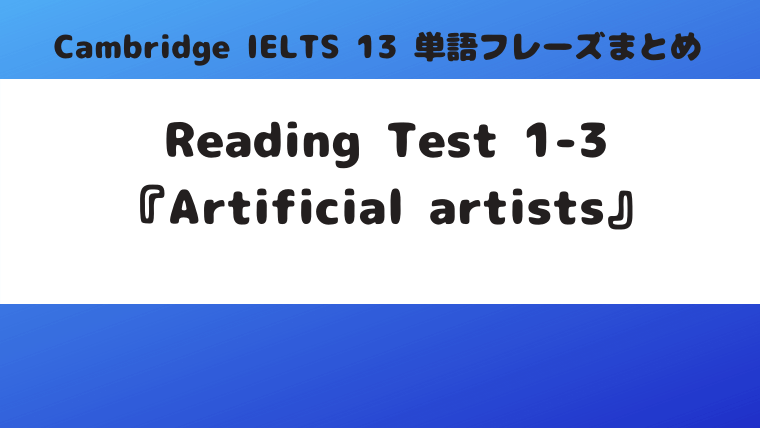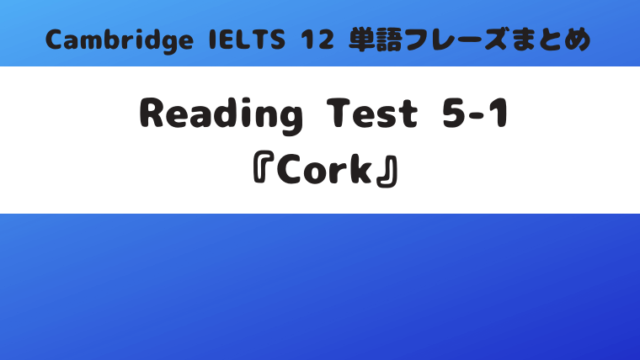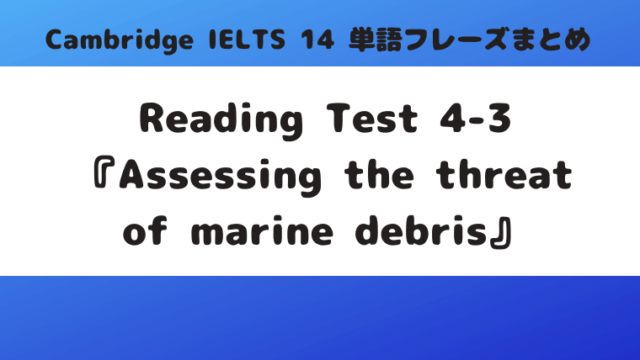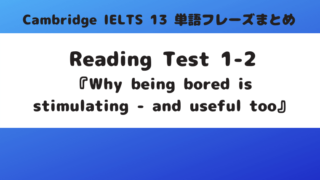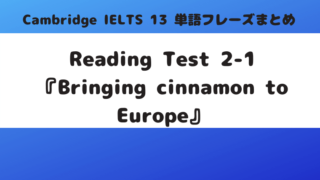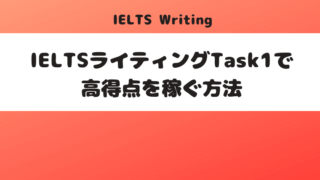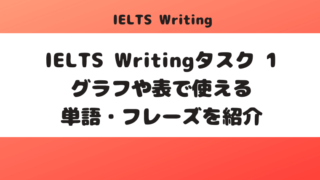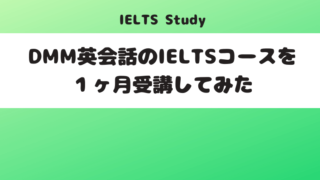「Cambridge IELTS 13」Reading Test1-3『Artificial artists』の単語・フレーズをまとめました。
私がIELTS Readingの単語・まとめを行う理由は「Cambridge IELTS Reading単語・フレーズまとめ」からご覧ください。
Reading Test 1 Passage 3:Artificial artists
- enraptured
adjective /ɪnˈræp.tʃəd/
filled with great pleasure or extremely pleased by something:
うっとりした, 有頂天になった
prestigious
adjective /presˈtɪdʒ.əs/
very much respected and admired, usually because of being important
一流の, 名門の, 権威ある - scare
verb /skeər/
to (make a person or animal) feel frightened
1 《他》 <人> を怖がらせる, おびえさせる
同意 frighten
2 scare easily
すぐに怖がる
(実践IELTS英単語3500:921) - computerize / computerise
verb /kəmˈpjuː.tər.aɪz/
to use a computer to do something that was done by people or other machines before
コンピュータ化された, 電子化された - paintbrush
noun /ˈpeɪnt.brʌʃ/
a brush used for putting paint on a surface or on a picture
(絵を描く) 絵筆, (ペンキを塗る) はけ
paint
verb /peɪnt/
to cover a surface with paint:
to make a picture using paints:
If you paint your nails or face, you put make-up on that part of your body
1 a) 《他》 <壁・家など> にペンキを塗る, を塗装する
b) 《自》 ペンキを塗る
2 a) 《他》 (絵の具で) …を描く
b) 《自》 絵を描く
3 《他》 <顔など> に化粧する, <爪つめ> を染める
4 《他》 (独特な描き方で) …を描く, 描写する
paint a (grim / rosy / accurate) picture of something
<…>を(厳しく[ばら色に,正確に])描く
paint somebody / something as something
<…>を<あるタイプのもの>として描く - perhaps
adverb /pəˈhæps/
used to show that something is possible or that you are not certain about something:
used to show that a number or amount is approximate
used when making polite requests or statements of opinion
1 たぶん, ことによると, もしかすると
同意 maybe
2 (断定的に言うのを避けて) たぶん, 恐らく
3 だいたい
同意 maybe
4 〘話〙 (丁寧な提案・依頼などで) よろしければ, できましたら
同意 maybe - keen
adjective UK /kiːn/
very interested, eager, or wanting (to do) something very much:
1 《名の前不可》 熱望した, 切望した
keen to do something
<…>することを熱望した
keen on doing something
<…>するのに乗り気な
keen for somebody / something to do something
<…>が<…>するのを切望している
2 (趣味・スポーツなどに) 熱中した, 熱心な
3 (仕事・勉強などに) 熱心な, 意欲的な
4 《名の前不可》 英 be keen (on something)
(<…>を)気に入った, 好みに合った
5 be keen on somebody
英 <人>に気がある
6 <感覚などが> 鋭い, 鋭敏な
7 <感情などが> 激しい, 強い
8 <知性などが> 鋭い, <頭が> 切れる
9 <競争などが> 激烈な, 激しい
10 〘やや古〙 <刃物などが> 鋭利な
11 〘文〙 <風・寒さなどが> 身を切るような
12 英 <価格などが> 格安の
(実践IELTS英単語3500:310) - minimal
adjective /ˈmɪn.ɪ.məl/
very small in amount:
最小限の, 最低の
(実践IELTS英単語3500:2511) - trawl
verb UK /trɔːl/
to pull a large, cone-shaped net through the sea at a deep level behind a special boat in order to catch fish:
to search among a large number or many different places in order to find people or information you want:
1 a) 《自》 トロール漁[底引き漁]をする
b) 《他》 <場所> でトロール漁をする
2 …を徹底的に調べる[探す]
trawl through something
<文書など>を徹底的に調べる
trawl for something
<情報など>を徹底的に探す - fuzzy
adjective /ˈfʌz.i/
(of an image) having shapes that do not have clear edges, or (of a sound, especially from a television, radio, etc.) not clear, usually because of other unwanted noises making it difficult to hear:
informal not clear:
1 <輪郭・考えなどが> ぼやけた, はっきりしない
2 綿毛で覆われた, けばだった
3 <画像・音声などが> ぼやけた, 不鮮明な
4 <毛髪が> 縮れた - depict
verb /dɪˈpɪkt/
to represent or show something in a picture or story
(著作・絵画などで) …を表現する, 描く, 描写する
(実践IELTS英単語3500:2399) - glitch
noun /ɡlɪtʃ/
・a small problem or fault that prevents something from being successful or working as well as it should:
・electronics specialized a sudden unexpected increase in electrical power, especially one that causes a fault in an electronic system:
1 (機械・計画などの) 問題点
without a glitch
支障なく
2 グリッチ ((電圧の突然の変化[急増]))
eerie
adjective /ˈɪə.ri/
strange in a frightening and mysterious way
不気味な, 薄気味悪い - renowned
adjective /rɪˈnaʊnd/
famous for something
著名な, 有名な
laud
verb /lɔːd/
to praise:
〘フォーマル〙 …を称賛する - palette
noun /ˈpæl.ət/
a thin board with curved edges and a hole for your thumb, used by artists to mix their paints on while they are painting
art specialized the range of colours that an artist usually paints with:
1 Image of palette(絵画用の) パレット
2 《C通例単数形で》 (ある画家が用いる) 独特の色彩, 色調
3 (コンピュータで) パレット ((画面上に表示できる色の範囲)) - subtle
adjective /ˈsʌt.əl/
not loud, bright, noticeable, or obvious in any way:
achieved in a quiet way that does not attract attention to itself and is therefore good or clever
1 微妙な, かすかな, 目立たない
2 巧みな, 手の込んだ
3 繊細な, 柔らかい
4 《通例名の前で》 (理解力などが) 鋭い, 明敏な
(実践IELTS英単語3500:1598) - revered
verb /rɪˈvɪər/
to very much respect and admire someone or something:
…を尊敬する, 崇敬する - blasted
adjective /ˈblɑː.stɪd/
・old-fashioned informal used in phrases to express anger:
・literary used to refer to a plant or piece of land that has been damaged or destroyed by extreme cold, heat, or wind:
・informal drunk:
1 〘やや古・話〙 いまいましい, いやな
2 〘文〙 風害を受けた, (あらしによる) 被害を受けた
(実践IELTS英単語3500:1684) - condemned
adjective /kənˈdemd/
A condemned person is someone who is going to be killed, especially as a punishment for having committed a very serious crime, such as murder.
1 死刑宣告を受けた
2 (建物が) 使用禁止命令を受けた
(実践IELTS英単語3500:1834) - deliberately
adverb /dɪˈlɪb.ər.ət.li/
・intentionally:
・slowly and carefully:
1 意図的に, 計画的に, 故意に
同意 on purpose 反意 accidentally
2 慎重に, じっくりと
(実践IELTS英単語3500:1538) - vague
adjective /veɪɡ/
・not clearly expressed, known, described, or decided:
・not clear in shape, or not clearly seen:
・A vague person is not able to think clearly, or gives an impression of not thinking clearly in order to hide their real thoughts:
1 <発言・目的などが> あいまいな, はっきりしない
2 《名の前不可》 <人が> 明言しない
3 a vague idea / feeling / memory
漠然とした考え[感じ,記憶]
4 《名の前でのみ》 (感情・気持ちなどが) かすかな, ほんの少しの
5 <表情などが> ぼんやりした, うつろな
6 a vague outline / shape
ぼんやりした輪郭[形]
(実践IELTS英単語3500:703) - replica
noun /ˈrep.lɪ.kə/
an exact copy of an object
《C》 複製, レプリカ
(実践IELTS英単語3500:3156) - rely on/upon something/someone
to depend on or trust someone or something
1 <…>を当てにする, 頼りにする
2 <…>に頼る, 依存する
→ rely heavily on something - impulse
noun /ˈɪm.pʌls/
C2 [ C + to infinitive ] a sudden strong wish to do something:
C2 because you suddenly want to, although you haven’t planned to:
1 《C, U》 (発作的な) 衝動
2 an impulse buy / purchase
衝動買いした物
3 《C通例単数形で》 (本能的な) 衝動
4 《C》 〘専門〙 衝撃, インパルス ((神経・電線を一方向に通る短い電気信号)) - outraged
adjective /ˈaʊt.reɪdʒd/
feeling outrage
1 激怒した
2 激しい怒りを訴える
(実践IELTS英単語3500:2628) - recoil
verb /rɪˈkɔɪl/
to move back because of fear or disgust (= dislike or disapproval):
to refuse to accept an idea or principle, feeling strong dislike or disapproval
1 後ずさりする
2 たじろぐ, しり込みする
3 <発射した銃が> 反動で跳ね返る - prejudice
noun [ C or U ] UK /ˈpredʒ.ə.dɪs/ US /ˈpredʒ.ə.dɪs/
・an unfair and unreasonable opinion or feeling, especially when formed without enough thought or knowledge:
・without prejudice to sth law formal or specialized
If a decision or action is made without prejudice to a right or claim, it is made without having an effect on that right or claim
《C, U》 (人種・性別などに対する) 偏見, 先入観
(実践IELTS英単語3500:1173) - reckon
verb UK /ˈrek.ən/
・informal to think or believe
・to consider or have the opinion that something is as stated:
・mainly uk to calculate an amount:
1 <数量など> を推定する, 推測する
2 《通例受け身形で》 be reckoned to be something
<…>と見なされている[考えられる]
3 〘話〙 …を思う
4 reckon to do something
英 〘インフォーマル〙 <…>するつもりである
5 〘フォーマル〙 …を数える, 計算する
(実践IELTS英単語3500:1569) - stem from
to start or develop as the result of something:
(事態・問題などが) <…>から生じる, に由来する - irresistible
adjective /ˌɪr.ɪˈzɪs.tə.bəl/
impossible to refuse, oppose, or avoid because it is too pleasant, attractive, or strong:
1 抵抗[がまん]できない
2 <感情などが> 抑えきれない, こらえきれない
(実践IELTS英単語3500:3029) - speculation
noun /ˌspek.jəˈleɪ.ʃən/
・the activity of guessing possible answers to a question without having enough information to be certain:
・the act of speculating in order to make a profit
1 憶測, 推量
2 投機 - depth
noun UK /depθ/ US /depθ/
・the distance down either from the top of something to the bottom, or to a distance below the top surface of something:
・the lowest part of the sea:
・the state of having serious qualities or the ability to think seriously about something:
・in a serious and detailed way:
・the distance from the front to the back of something
1 《C, U》 (海・川・穴などの) 深さ, 深度
2 《C, U》 (戸棚・引き出しなどの) 奥行き
3 the depth of something <感情>の深さ, 強さ
4 the depth of something <問題・危機など>の重大さ, 深刻さ
5 《U》 (知識・理解力などの) 深さ, 深み, 豊富さ
6 《C, U》 (芸術・人などの) 奥深さ, 深み
7 the depths 《常に複数形で》 〘文〙 深海
8 the depths of the forest / earth / countryside
森[地球,田舎]の奥地
9 《U》 (チームなどの) 層の厚さ, (人材の) 豊富さ
10 《U》 (色・風味などの) 濃さ, 深さ, (音などの) 低さ, 太さ
(実践IELTS英単語3500:410) - precisely
adverb UK /prɪˈsaɪs.li/
・exactly:
・used to emphasize what you are saying:
・used to express complete agreement with someone or suggest that what they have said is obvious:
・approving carefully and accurately:
1 正確に, ちょうど
同意 exactly
2 まさに
同意 just
3 〘話〙 (同意して) そのとおり
同意 exactly
(実践IELTS英単語3500:342)
